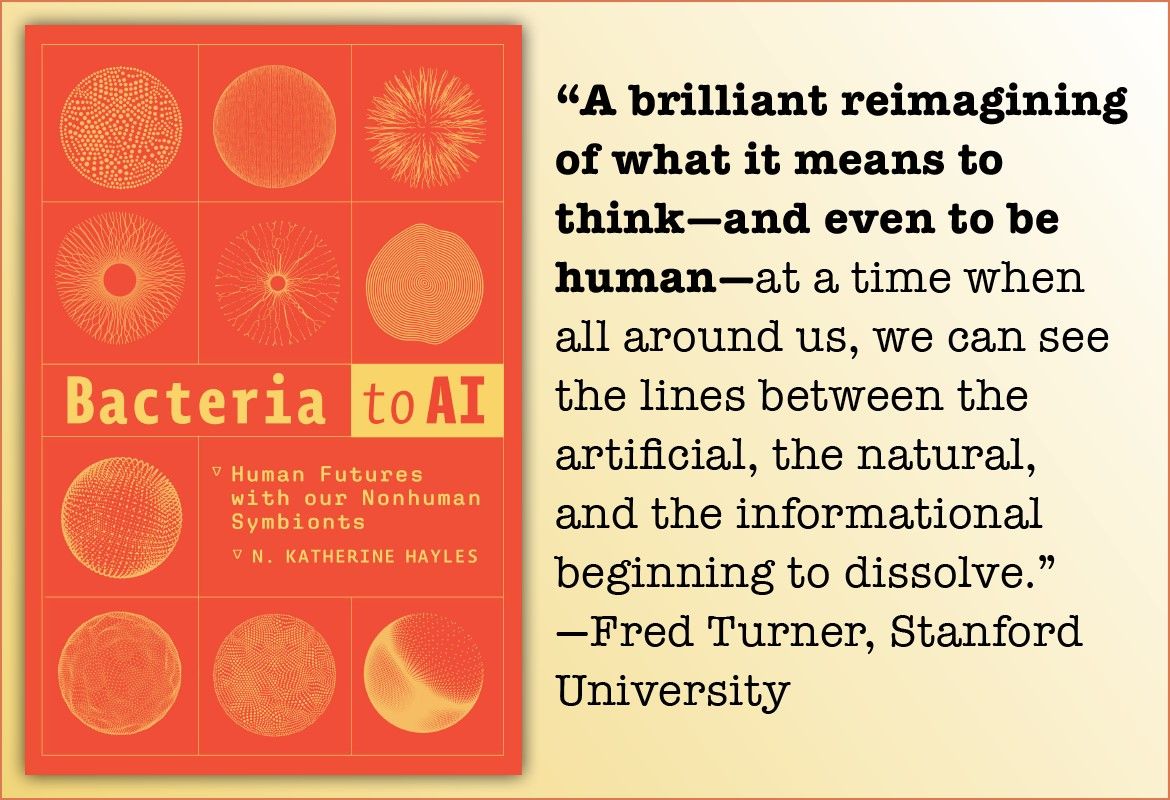Bacteria to AI
Human Futures with Our Nonhuman Symbionts
A new theory of mind that includes nonhuman and artificial intelligences.
The much-lauded superiority of human intelligence has not prevented us from driving the planet into ecological disaster. For N. Katherine Hayles, the climate crisis demands that we rethink basic assumptions about human and nonhuman intelligences. In Bacteria to AI, Hayles develops a new theory of mind—what she calls an integrated cognitive framework (ICF)—that includes the meaning-making practices of lifeforms from bacteria to plants, animals, humans, and some forms of artificial intelligence. Through a sweeping survey of evolutionary biology, computer science, and contemporary literature, Hayles insists that another way of life, with ICF at its core, is not only possible but necessary to safeguard our planet’s future
The much-lauded superiority of human intelligence has not prevented us from driving the planet into ecological disaster. For N. Katherine Hayles, the climate crisis demands that we rethink basic assumptions about human and nonhuman intelligences. In Bacteria to AI, Hayles develops a new theory of mind—what she calls an integrated cognitive framework (ICF)—that includes the meaning-making practices of lifeforms from bacteria to plants, animals, humans, and some forms of artificial intelligence. Through a sweeping survey of evolutionary biology, computer science, and contemporary literature, Hayles insists that another way of life, with ICF at its core, is not only possible but necessary to safeguard our planet’s future
304 pages | 3 halftones, 3 tables | 6 x 9 | © 2025
Biological Sciences: Evolutionary Biology
Cognitive Science: Human and Animal Cognition
Literature and Literary Criticism: General Criticism and Critical Theory
Reviews
Table of Contents
1 An Integrated Cognitive Framework
2 Can Computers Create Meanings? A Technosymbiotic Perspective
3 The Emergence of Technosymbiosis and Gaia Theory
4 Cellular Cognition: Mimetic Bacteria and Xenobot Creativity
5 Rocks and Microbes: The Two Different Temporal Regimes of Biological and Mineral Evolution
6 Inside the Mind of an AI: Materiality and the Crisis of Representation
7 GPT-4: The Leap from Correlation to Causality and Its Implications
8 Subversion of the Human Aura: Three Fictions of Conscious Robots
9 Collective Intelligences: Assessing the Roles of Humans and AIs
10 Planetary Reversal: Ecological Relationality versus Political Liberalism
Acknowledgments
Notes
Bibliography
Index
2 Can Computers Create Meanings? A Technosymbiotic Perspective
3 The Emergence of Technosymbiosis and Gaia Theory
4 Cellular Cognition: Mimetic Bacteria and Xenobot Creativity
5 Rocks and Microbes: The Two Different Temporal Regimes of Biological and Mineral Evolution
6 Inside the Mind of an AI: Materiality and the Crisis of Representation
7 GPT-4: The Leap from Correlation to Causality and Its Implications
8 Subversion of the Human Aura: Three Fictions of Conscious Robots
9 Collective Intelligences: Assessing the Roles of Humans and AIs
10 Planetary Reversal: Ecological Relationality versus Political Liberalism
Acknowledgments
Notes
Bibliography
Index

